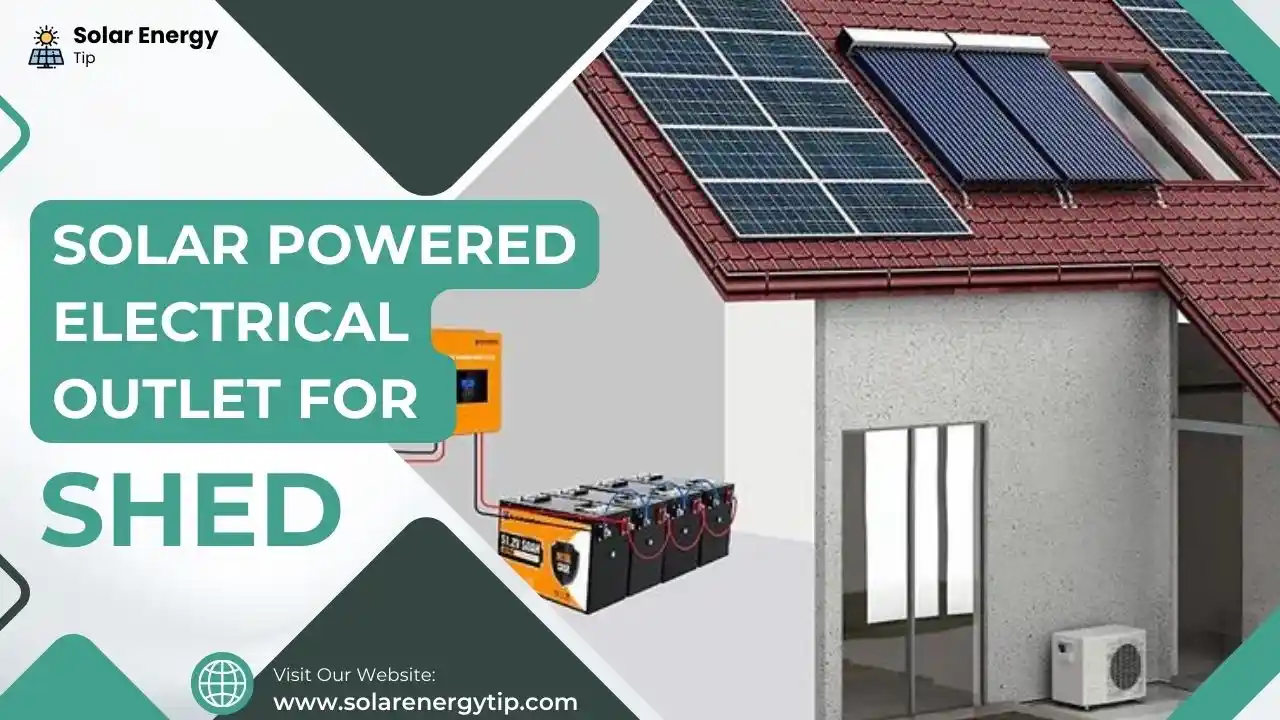Do you need a Solar Powered electrical outlet for Shed? You’re in luck if so. I’ve discovered the most excellent product on the market to save money and make you more productive.
If you want to power your shed but don’t have access to electricity, then you can invest in this product. 😊
By 2020, more than 2 million solar energy systems will be installed in the US, according to the National Renewable Energy Laboratory (NREL).
One of the most popular ways to harness solar energy is by installing a solar-powered electrical outlet in your shed.
It allows you to use solar power to run lights, small appliances, and tools in your shed without being connected to the grid.
- What is a Solar Powered Electrical Outlet for a Shed?
- What Size Solar System Do I Need For a Shed?
- Best 7 Solar Power Kit for Shed with Battery
- Why Would You Need One For Your Shed?
- Is It Worth Putting Solar Panels on Your Shed?
- How Does It Work?
- How Much Solar Power Is Needed For a Shed?
- What are the Advantages of Using a Solar Powered Outlet for a Shed?
- What Are the Disadvantages of Using Solar Powered Outlet for a Shed?
- Can Solar Electricity be Used to Run Your Shed? We’ll look at a few Related Things Below
- Who Makes the Best Solar-Powered Electrical Outlet for Shed?
- How Do I Choose Which One to Buy?
- Faqs
- Conclusion
What is a Solar Powered Electrical Outlet for a Shed?
This is an innovative, eco-friendly solution for those looking to power their shed.
This device utilizes the sun’s energy to generate electricity and can power any device or appliance that uses an electrical outlet.
It is an excellent option for those looking to reduce their energy consumption while still being able to access electricity in a remote location.
This device is easy to install and requires very little maintenance, making it the ideal solution for anyone looking for an efficient, renewable energy source.
I recommend the best solar-powered electrical outlet for the shed.
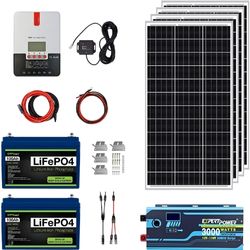
ExpertPower 2.5KWH
12V Solar Power Kit
LiFePO4 12V 100Ah, 30A, 3KW Pure Sine Wave Inverter Charger |400W Mono Solar Panels. It is also used in RV, MPPT Solar Charge Controller, Trailer, Camper, Marine, and Off Grid.
What Size Solar System Do I Need For a Shed?
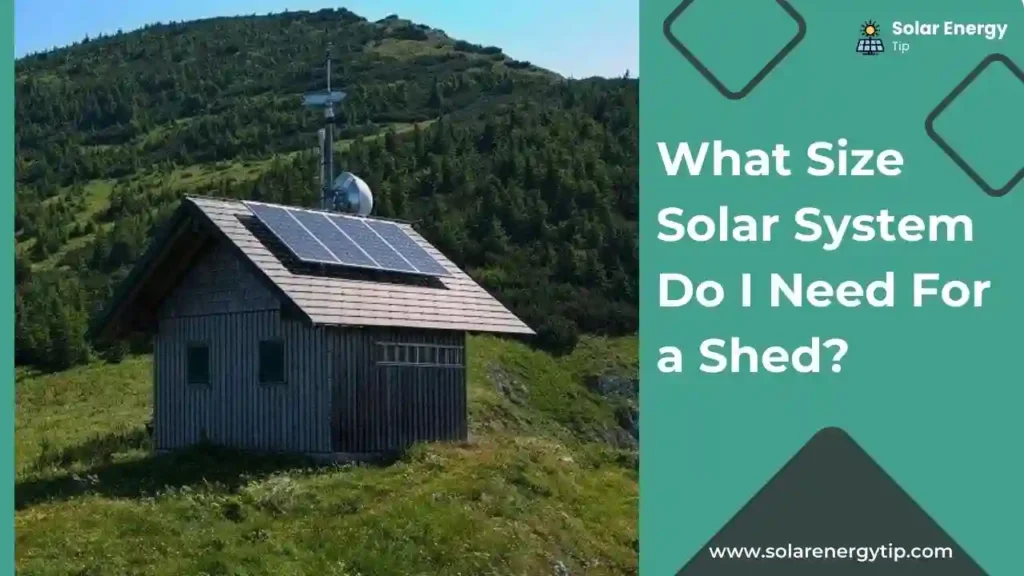
When it comes to powering an electrical outlet in a shed, the size of the solar system needed depends on the appliances to be powered and the amount of electricity they require.
Generally, a solar PV system with a 5 kWh battery can provide up to 5,000 watts of electricity daily.
However, you will need a more extensive system to power multiple appliances simultaneously.
Additionally, if you want to power lights, fans, or other low-wattage appliances throughout the day, you may need to invest in a better, more extensive system.
It is essential to consider these factors when deciding what size solar system is best for your shed.
The table provides a rough estimate of solar panel size based on average daily energy consumption, assuming a standard solar panel efficiency of around 15-20%.
This means a 100-watt solar panel will produce approximately 100 watts x 15-20% = 15-20 watts per hour.
| Daily Energy Consumption (watt-hours) | Recommended Solar Panel Size (Watts) |
|---|---|
| 100 | 80-100 |
| 200 | 150-200 |
| 300 | 250-300 |
| 400 | 350-400 |
| 500 | 450-500 |
| 600 | 550-600 |
| 700 | 650-700 |
| 800 | 750-800 |
| 900 | 850-900 |
| 1000 | 950-1000 |
Best 7 Solar Power Kit for Shed with Battery
Here are the 7 best solar power kits that you can use in your shed when you are off the grid…
1. ExpertPower Solar Power Kit for Shed with Battery

ExpertPower 2.5KWH
12V Solar Power Kit
LiFePO4 12V 100Ah, 30A, 3KW Pure Sine Wave Inverter Charger |400W Mono Solar Panels. It is also used in RV, MPPT Solar Charge Controller, Trailer, Camper, Marine, and Off Grid.
The ExpertPower Solar Power Kit with Battery is ideal for anyone using solar energy to power their shed.
This kit includes a 30-watt solar panel, a deep cycle battery, mounting brackets, a charge controller, and all wires and connectors required.
This simple kit can power lights, small appliances, and even your phone or tablet.
You can store the energy collected from the sun using the included battery for later use.
The ExpertPower Solar Power Kit with Battery is an excellent choice for powering your shed without relying on the power grid.
Pros and Cons
Pros
- Easy to install and use.
- It can power lights and small appliances, and charge electronics.
- Battery included for storing energy collected from the sun.
- Cost-effective solution for powering the shed without relying on an electrical grid.
Cons
- Expensive upfront cost.
- Maintenance and cleaning may be required to ensure proper functioning.
- Weather dependent – cloudy or rainy days can decrease the amount of energy collected.
2. Renogy 12-Volt Monocrystalline Solar Starter Kit
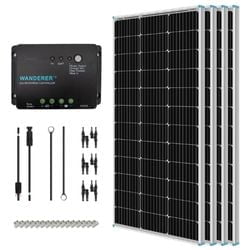
Renogy 400 Watt 12 Volt
Solar Panel Starter Kit
4 pcs 100W Monocrystalline Solar Panel and Boats, 30A Wanderer PWM Charge Controller for RV, Trailer, Camper, Marine, Off-Grid Solar Power System
Renogy’s 12-Volt Monocrystalline Solar Starter Kit powers an outdoor shed or workshop.
It’s the ideal choice for anyone looking for a dependable and sustainable source of electricity, thanks to its advanced solar power technology and simple installation.
This kit comes with a 20W monocrystalline solar panel, an 8-amp charge controller, a 10-foot tray cable, and all mounting hardware.
It’s ideal for powering tools, lights, and other accessories in your shed or workshop, and it can charge 12-volt and 24-volt batteries.
The Renogy 12-Volt Monocrystalline Solar Starter Kit is an excellent choice for any DIY enthusiast or anyone looking for a dependable energy source for their shed.
Pros and Cons
Pros
- It is simple to install and use.
- Long-lasting and weatherproof construction.
- A 20A waterproof LCD charge controller is included.
- Easy mounting on level surfaces or the ground using hardware.
Cons
- Costlier than other solar starting kits.
- Its 200-watt peak power production renders it unsuitable for large-scale solar projects.
- Non-compatible batteries include lead-acid.
3. Grape Solar GS-400-KIT 400-Watt Off-Grid Solar Panel Kit
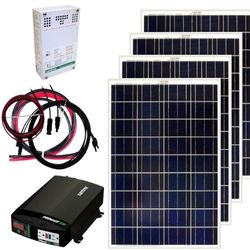
Grape Solar GS-400-KIT
400-Watt Off-Grid Solar Panel Kit
Charge portable devices and be connected to the 40 Amp Comet PWM charge controller with additional cables. Requires one 12 Volt deep cycle battery (not included).
The Grape Solar GS-400-KIT 400-Watt Off-Grid Solar PanelKit is a cutting-edge product that offers a cost-effective way to power your shed.
A 400-watt solar panel, mounting brackets, and a solar power electrical outlet are included in this kit. It is simple to install and does not require any additional wiring.
This kit allows you to build your solar power grid for your shed, making it an excellent solution for those who require reliable energy in remote locations.
This kit is an excellent choice for anyone looking for a cost-effective and efficient way to power their shed.
Pros and Cons
Pros
- Easy to install and use
- It can be used for off-grid applications like cabins, boats, or RVs
- Highly efficient at converting sunlight into electricity
- Comes with all necessary hardware and accessories
- Built-in charge controller allows for optimal battery health
Cons
- Requires a good amount of space for installation
- Expensive compared to other solar panels
- Not suitable for large-scale energy production
4. Eco-Worthy 400 Watt 12 Volt Polycrystalline Solar Panel Complete Kit with Battery & Inverter
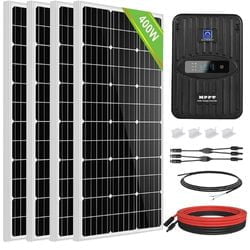
ECO-WORTHY 400 Watt
12 Volt Solar Panel Kit
Off Grid with 4pcs 100W Solar Panels + 12V/24V 40A MPPT Charge Controller + RV, Cabins, Caravan, Shed, etc.
The Watt Volt Polycrystalline Solar Panel Complete Kit from Eco-Worthy is ideal for adding a solar-powered electrical outlet to any shed.
A 40A 12V/24V MPPT charge controller, four 100W polycrystalline solar panels, two 100AH deep cycle batteries, and a 1000W pure sine wave inverter are included in the kit.
With this kit, you can easily install an eco-friendly way to power lights and other small electrical items in your shed.
This kit not only provides convenience and peace of mind, but it also helps to reduce your carbon footprint.
Pros and Cons
Pros
- Up to 400 watts of power from highly efficient polycrystalline solar panels
- Includes a battery and inverter for simple installation and operation
- Up to 400 watts of power from highly efficient polycrystalline solar panels
- Includes a 40A 12V/24V MPPT charge controller.
Cons
- Not all inverters are compatible;
- Not all batteries are compatible;
- kit does not include wiring or mounting hardware.
5. Topsolar 12V Solar Panel Kit
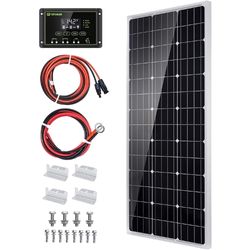
Topsolar Solar Panel Kit
Monocrystalline Off-Grid System
100-watt 12-volt monocrystalline off-grid system for homes, RVs, and boats + 20 amp 12 volt/24-volt solar charge controller + solar cables + mounting Z-brackets
Topsolar has recently released its new V Solar Panel Kit, designed to provide solar-powered electrical outlets for sheds and other outbuildings.
This kit is easy to install and requires no additional wiring or hardware. It has a powerful output of up to 1000 Watts, providing a reliable power source for many applications.
The kit also comes with a one-year warranty, ensuring your investment remains secure.
With this innovative new kit, Topsolar is revolutionizing how we power our outdoor spaces.
Pros and Cons
Pros
- Easy to install and use
- A cost-effective way to generate power
- Environmentally friendly
- High-efficiency mono solar panel
- It can be used in both on and off-grid systems
- Lightweight and portable
Cons
- Limited power output compared to larger solar systems
- Requires direct sunlight for optimal operation
- More expensive than other energy sources
- Requires regular maintenance and upkeep
6. ECI Power 200W 12V Solar Power Kit
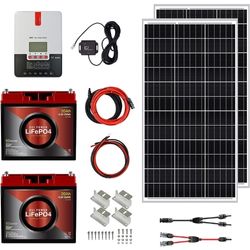
ECI Power 200W
12V Solar Power Kit
2 x 12V 20Ah LiFePO4 Lithium Batteries | 200W Mono Rigid Solar Panels | RV, Trailer, Camper, Marine, Off Grid, Solar Projects, 20A MPPT Solar Charger |
ECI Power recently released its W V Solar Power Kit, which offers a convenient and cost-effective way to power outdoor sheds.
This kit includes a solar panel, an electrical outlet, and all the installation components.
This solar panel can produce up to 600 watts of energy and is simple to install on any flat surface.
This kit lets homeowners power their outdoor sheds without needing traditional electrical wiring or outlets.
This solar-powered electrical outlet is an excellent choice for those looking for a cost-effective and environmentally friendly way to power their outdoor sheds.
Pros and Cons
Pros
- Highly efficient solar cells
- Easy to install
- It comes with a 10A charge controller
- It can be installed in remote locations
- Low maintenance costs
- Durable and reliable power source
Cons
- The initial cost can be high for some users
- Requires good solar exposure for optimal performance
- Not suitable for more significant energy requirements
7. GVSHINE Solar Power Kit System for shed
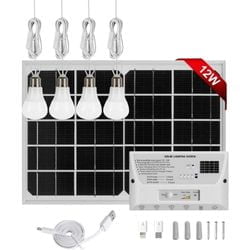
GVSHINE Solar Pendant Lighting System
12W Solar Panel 6000mAh
Cell Phone Charger,12W Solar Panel with 4 Bulbs Solar Lighting Kit and AC Power Adapter for Indoor or Outdoor Use, Shed, Fence, Patio
The new solar-powered pendant lighting system from GVSHINE is a revolutionary new way to bring light to your shed without relying on conventional electrical outlets.
This system uses solar power to provide lighting in areas where conventional electricity is unavailable, making it an excellent choice for sheds, garages, and other outdoor spaces.
The system is simple to set up and comes in various styles and sizes.
You can now bring light and energy independence to your shed with GVSHINE’s solar pendant lighting system.
Pros and Cons
Pros
- Easy to install
- Cost-effective solution for lighting a shed
- Can be used in remote locations without an existing grid connection
- No need for an external power source
- Environmentally friendly and sustainable
Cons
- Battery backups or wires may be needed for extended use.
- Replacing or upgrading solar panels is expensive.
- May not illuminate huge sheds or low-light areas.
- Clean, effective panels need frequent upkeep.
Why Would You Need One For Your Shed?
Because if your shed is in an area where the power companies’ lines do not reach the lines with the current.
In addition, if your shed is in a forested or remote area, you must use a solar outlet to get enough electricity.
Although electricity is a necessary utility for any shed, not all sheds are connected to the power grid.
These are solar-powered outlets that, when combined with solar panels, can provide a consistent and dependable source of electricity regardless of the shed’s location.
Get this type of electricity, which effectively lowers your costs and is an excellent option for anyone looking to power their shed in an environmentally friendly way.
You can use solar electric power outlets as per the below requirement 👇
Is It Worth Putting Solar Panels on Your Shed?
- Yes, if your shed gets direct sunlight for most of the day.
- Yes, if you have access to a nearby power source to connect the solar panel too.
- Yes, if you are looking for an environmentally friendly solution for powering your shed.
- Yes, if you are willing to invest in solar panels’ equipment and installation costs.
- Yes, if you want to save money on your electricity bills in the long run.
Solar panels are becoming more popular as an alternative energy source and can be handy for sheds.
Solar-powered electrical outlets are also becoming more affordable and straightforward to install, making them an appealing option for anyone looking to power their shed without breaking the bank.
How Does It Work?
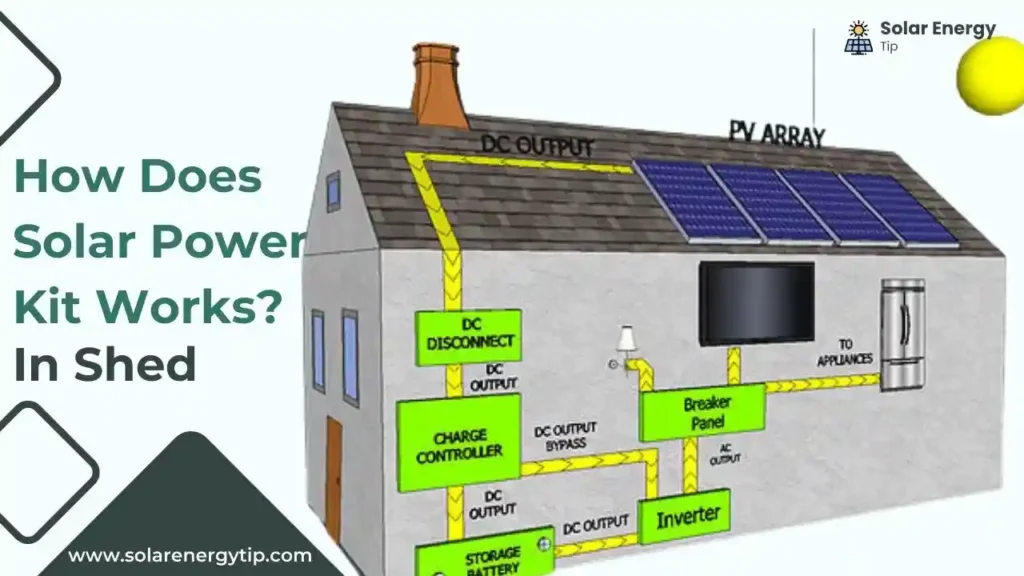
A solar-powered electrical outlet is designed to make it easy to bring power to any shed.
It captures the sun’s energy, converts it into electricity, and then sends it through a wire connecting it to the shed.
A solar-powered electrical outlet is easy to install. It requires no external power source, making it an ideal solution for those who want to power their shed with minimal effort.
With this innovative technology, anyone can bring power to their shed with just a few simple steps.
How to Run Solar Power to a Shed
Due to the abundance of solar-powered products today, running solar power to your shed is becoming increasingly popular.
Installing a solar power outlet in your shed is a great way to use renewable energy sources to improve energy efficiency and lower energy bills.
When installing a system, it is critical to consider roof space, shading, and the type of solar-powered electrical outlet, as these factors will affect the overall efficiency and cost of the installation.
Running solar power to a shed involves several steps:
👉 Step 1: Calculate the Shed’s Power Needs
Assess how much electricity you will use in your shed, including the wattage of the appliances and tools you will use and how frequently they will be used.
👉 Step 2: Mount Solar Panels onto the Shed Roof
Install solar panels on the roof of your shed or another nearby structure. Solar panels should be installed in an area that receives the most sunlight and is not shaded.
👉 Step 3: Connect Solar Panels to an Inverter
The inverter transforms the direct current (DC) power stored in the battery bank into alternating current (AC power), which can power lights, small appliances, and tools in your shed.
👉 Step 4: Connect the solar panels to a charge controller
The charge controller regulates the flow of electricity from the solar panels to the battery bank, ensuring that the battery is safely and efficiently charged.
👉 Step 5: Connect Inverter to the Battery Bank
The battery bank stores electricity for later use, allowing the shed to be powered even when the sun is not shining.
👉 Step 6: Run Cables from the Battery Bank to the Shed
Installing a solar-powered electrical outlet for the shed requires running cables from a battery bank to the hut.
Using the correct cable type for this job is essential, as it will ensure that the circuit will be safely powered.
Additionally, the cables need to be securely fastened and connected to the battery bank to power the shed’s electrical system correctly. Once these cables are installed, the solar-powered electrical outlet can be safely used in the shed.
👉 Step 7: Install Receptacles, Switches, and Lighting as Necessary
Installing solar-powered receptacles, switches, and lighting in your shed is a great way to add convenience and energy savings.
With suitable materials, you can easily install solar-powered outlets, switches, and lighting in your shed.
Depending on the type of shed you have, you may need to use different methods for installation.
It is essential to follow all instructions carefully to ensure everything is installed correctly and safely.
With a little effort, you can add some extra convenience while saving energy simultaneously.
How Much Solar Power Is Needed For a Shed?
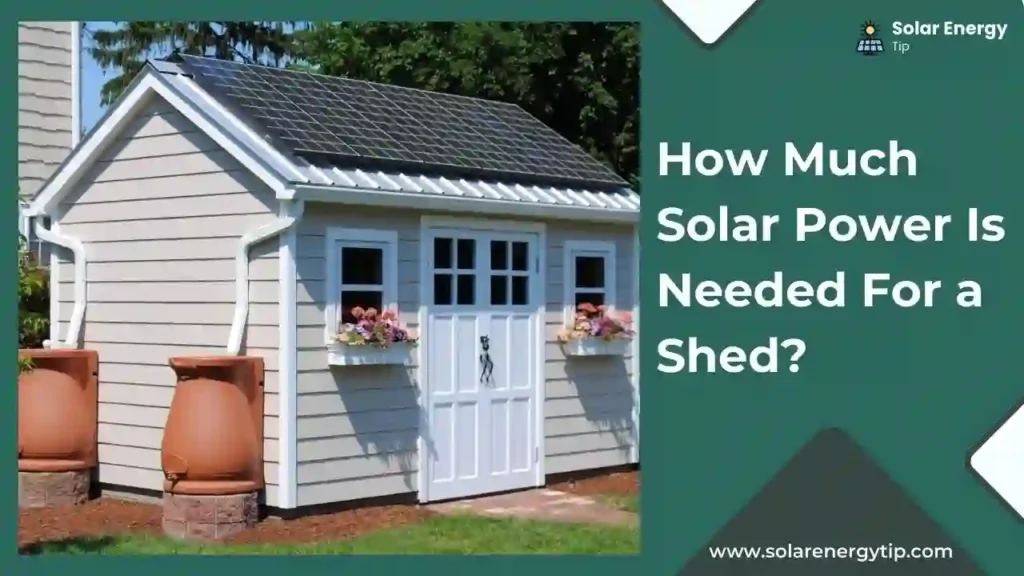
The amount of solar power required must be determined. The size of the shed and the number of electrical outlets that must be powered determine this.
Calculating your solar needs is an essential first step in determining the size and number of solar panels required to power the electrical outlet in your shed.
You can install a solar-powered electrical outlet in your shed with the correct information below.
You can figure out how much solar power is required for your shed from a few points, which are as follows.
Read More: The Biggest Solar Farm in the USA Best Guide
Off-Grid Solar System for Shed
Off-grid solar systems are intended to provide power to areas that do not have access to a traditional power grid. Solar panels are used in these systems to collect and convert sunlight into usable energy.
This energy is then captured and stored in batteries before powering the shed.
This system is ideal for remote locations because it eliminates the need for costly and unreliable power lines. Off-grid solar systems can lower energy costs while producing clean, renewable energy.
What are the Advantages of Using a Solar Powered Outlet for a Shed?
What Are the Disadvantages of Using Solar Powered Outlet for a Shed?
Can Solar Electricity be Used to Run Your Shed? We’ll look at a few Related Things Below
💡 Solar energy can be used to run a shed.
💡 Solar panels can be positioned on the ground or affixed to the shed roof
💡 A solar charge controller is required to manage the current from the solar panels and direct it to the battery.
💡 An inverter is required to turn the direct current (DC) electricity from the battery into alternating current (AC) power for appliance usage.
💡 You might need a backup generator if you don’t have access to a grid-tied system to provide electricity when there isn’t enough sunlight for your solar system to produce.
Who Makes the Best Solar-Powered Electrical Outlet for Shed?
Renogy is a well-known and reputable brand in the solar industry, and this system is designed to be simple to install and use, making it an excellent choice for shed owners looking to power their shed with solar energy.
This system includes four 100-watt solar panels producing up to 400 watts. The 40A MPPT charge controller is highly efficient, and the Bluetooth module allows you to monitor the system’s performance using your smartphone remotely.
Mounting brackets and an adapter kit are also included, as tray cables, simplifying installation.
It’s important to note that this is just one option; there are other brands and models on the market, so do your research, read reviews, and compare features, warranties, and prices before deciding.
It is also critical to consult with a solar professional to ensure that the solar-powered electrical outlet you select is the correct size for your specific needs and is appropriately installed.
The Renogy 400 Watt 12 Volt Premium 4 Pcs 100W Panel+40A MPPT Charge Controller+ Bluetooth Module Fuse+ Mounting Z Brackets+Adaptor Kit +Tray Cables Set is a highly rated shed solar power system.
How Do I Choose Which One to Buy?
Consider the amperage and voltage ratings, the size of the shed, and features such as surge protection and weatherproofing when shopping for a solar-powered electrical outlet for a Shed.
Finally, your specific requirements will determine the best solar-powered electrical outlet.
Buying Guides
Consult with a solar professional:
Working with a solar professional is recommended to ensure that the solar system you choose is the right size for your specific needs and is installed correctly.
Faqs
How many volts do I need for a shed?
Do you want to power your shed with 240V or 120V All lights, outlets, and appliances will run on 120 volts, but larger appliances such as a dryer or electric range will require 240 volts.
Do solar panels work without the sun?
Solar panels, on the other hand, can generate electricity even when there is no sun.
Solar panels are built to operate in all weather conditions, including cloudy days and at night. Solar panels generate electricity by utilizing ultraviolet light. Even on a cloudy day, ultraviolet light is present.
How do you light a shed without electricity?
Using a battery-powered LED light fixture, you can quickly and easily fill a shed with enough light to work. There is no need for an electrical outlet, and no professional installation experience is required
Can You Power a Shed With Solar?
Yes, you can use the sun to power your shed.
With the advent of a ground-breaking new product known as a solar-powered shed, homeowners can now harvest solar energy and use it to power lights, tools, and even appliances in their sheds.
Are Solar Sheds Worth It?
Using solar in your shed will be worth it. You will be exempted from paying any utility bills.
Solar sheds are becoming a popular option for shed owners who want to add a dependable source of electricity.
You can get electricity in your shed without relying on expensive utility companies if you use a solar-powered electrical outlet.
This system is simple, and many users report lower utility bills. A solar shed may be worth considering if you’re looking for a low-cost way to power your shed.
Conclusion
Finally, installing a solar-powered electrical outlet in a shed is a practical and cost-effective way to power equipment and appliances.
When choosing a solar system, it is critical to consider the appliances’ wattage and voltage requirements, the shed’s size, features, cost, maintenance requirements, and warranty information.
Working with a solar professional is also beneficial to ensure the system is installed correctly and meets your specific needs.
There are numerous types of solar-powered electrical outlets available on the market. However, your needs and budget determine which is best for you. So make an informed decision.

